
Albert I reigned as King of the Belgians from 1909 to 1934. He ruled during an eventful period in the history of Belgium, which included the period of World War I (1914–1918), when 90 percent of Belgium was overrun, occupied, and ruled by the German Empire. Other crucial issues included the adoption of the Treaty of Versailles, the ruling of the Belgian Congo as an overseas possession of the Kingdom of Belgium along with the League of Nations mandate of Ruanda-Urundi, the reconstruction of Belgium following the war, and the first five years of the Great Depression (1929–1934). King Albert died in a mountaineering accident in eastern Belgium in 1934, at the age of 58, and he was succeeded by his son Leopold III.
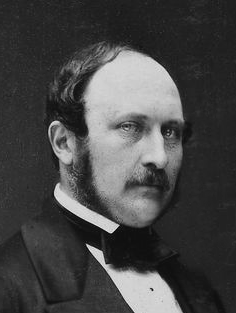
Prince Albert of Saxe-Coburg and Gotha was the husband of Queen Victoria of the United Kingdom of Great Britain and Ireland.
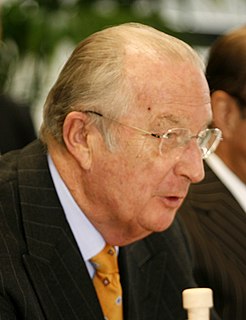
Albert II ; Dutch: Albert Felix Humbert Theodoor Christiaan Eugène Marie, pronounced [ˈɑlbərt ˈfeːlɪks ˈɦɵmbərt teːjoːˈdoːr ˈkrɪstijaːn øːˈʒɛːn maːˈriː]; German: Albrecht Felix Humbert Theodor Christian Eugen Maria, pronounced [ˈʔalbʁɛkt ˈfeːlɪks ˈhʊmbɛʁt ˈteːodoːɐ̯ ˈkʁɪsti̯an ˈʔɔʏɡn̩ maˈʁiːaː]; born 6 June 1934) reigned as King of the Belgians, from 1993 until his abdication in 2013.
The National Association of Underwater Instructors is a non-profit 501 (c) (6) association of scuba instructors. It is a recreational dive certification and membership organization established to provide international diver standards and education programs. The agency was founded in 1960 by Albert Tillman and Neal Hess. NAUI is headquartered in Tampa, Florida, US) with dive and member instructors, resorts, stores, service and training centers, located in Japan, South Africa, the Middle East, Europe, Brazil and the Pacific Rim.

Recreational diver training is the process of developing knowledge and understanding of the basic principles, and the skills and procedures for the use of scuba equipment so that the diver is able to dive for recreational purposes with acceptable risk using the type of equipment and in similar conditions to those experienced during training.
In-water recompression (IWR) or underwater oxygen treatment is the emergency treatment of decompression sickness (DCS) of sending the diver back underwater to allow the gas bubbles in the tissues, which are causing the symptoms, to resolve. It is a risky procedure that should only ever be used when the time to travel to the nearest recompression chamber is too long to save the victim's life.
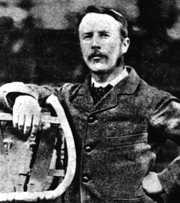
Henry Albert Fleuss was a pioneering diving engineer, and Master Diver for Siebe, Gorman & Co. of London.
Albert Alvin Tillman was an American educator and underwater diver.
The International Scuba Diving Hall of Fame (ISDHF) is an annual event that recognizes those who have contributed to the success and growth of recreational scuba diving in dive travel, entertainment, art, equipment design and development, education, exploration and adventure. It was founded in 2000 by the Cayman Islands Ministry of Tourism. Currently, it exists virtually with plans for a physical facility to be built at a future time.
The Bühlmann decompression algorithm is a mathematical model (algorithm) of the way in which inert gases enter and leave the human body as the ambient pressure changes. Versions are used to create Bühlmann decompression tables and in personal dive computers to compute no-decompression limits and decompression schedules for dives in real-time. These decompression tables allow divers to plan the depth and duration for dives and the required decompression stops.
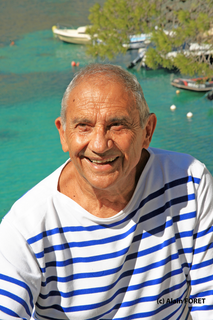
Albert falco was a French scuba diving veteran and champion of underwater conservation. He was one of the longest-serving diving companions of Jacques Cousteau, Chief Diver, and later Captain of the RV Calypso. He lived in France and was active in preserving aquatic ecosystems. He played several leading roles on Cousteau's films, like The Silent World (1956), World Without Sun (1964) and Voyage to the Edge of the World (1976).
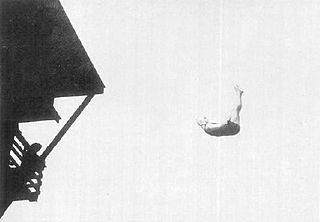
Albert Zürner was a German diver who competed in the 1906 Summer Olympics, in the 1908 Summer Olympics, and in the 1912 Summer Olympics.

John Deane, with his brother Charles, invented the diving helmet and performed diving operations at the wreck of the Mary Rose. They received their education at The Royal Hospital School, Greenwich and were both in attendance in 1812. When he was 14, John joined the East India Company and sailed for seven years.
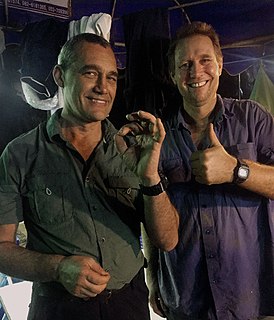
Craig Challen, is an Australian technical diver and cave explorer. He was the recipient of the Oztek 2009 Diver of the Year award for his services to caving, and was joint winner of the 2019 Australian of the Year.

Army engineer divers are members of national armies who are trained to undertake reconnaissance, demolition, and salvage tasks underwater. These divers have similar skills and qualifications as professional divers. In the United States Army, they are members of the Corps of Engineers. In the British Army they may be Royal Engineers Divers or Commando Engineer Divers.

YMCA SCUBA Program was an underwater diving training program operated by YMCA of the USA from 1959 to 2008. It was the first nationally organised underwater diving instruction program offered in the United States of America. A program with a similar content is now delivered by Scuba Educators International, an organisation founded by a group of former senior YMCA SCUBA instructors in 2008.
The Johnson Sea Link accident was a June 1973 incident that claimed the lives of two divers. During a seemingly routine dive off Key West, the submersible Johnson Sea Link was trapped for over 24 hours in the wreckage of the destroyer USS Fred T. Berry, which had been sunk to create an artificial reef. Although the submersible was eventually recovered by the rescue vessel A.B. Wood II, two of the four occupants died of carbon dioxide poisoning: 31-year-old Edwin Clayton Link and 51-year-old diver Albert Dennison Stover. The submersible's pilot, Archibald "Jock" Menzies, and ichthyologist Robert Meek survived. Over the next two years, Edwin Link designed an unmanned Cabled Observation and Rescue Device (CORD) that could free a trapped submersible.
Yona Roshen Knight-Wisdom is a Jamaican diver. He was born in Leeds, UK, but competes for Jamaica. Knight-Wisdom's father, Trevor Wisdom, is from Jamaica and his mother, Grace Knight, is from Barbados. He currently dives for City of Leeds Diving club along with British divers Jack Laugher, Chris Mears, Rebecca Gallantree and Alicia Blagg. He competed at the 2015 World Aquatics Championships, and qualified for the 2016 Summer Olympics. In doing so, he became the first male Jamaican diver at the Olympics, as well as the first male Olympic diver competing from any island in the Caribbean. Knight-Wisdom studied at Leeds Grammar School, and is a graduate of Leeds Beckett University, where he studied sport and exercise science.

The following index is provided as an overview of and topical guide to underwater divers:
Albert Knight was a British diver. He competed at the 1924 Summer Olympics and the 1928 Summer Olympics.











